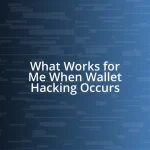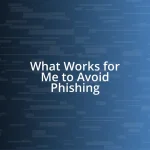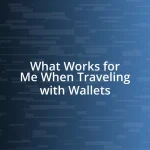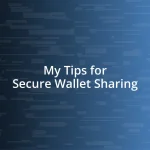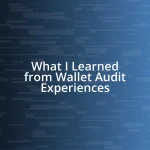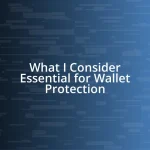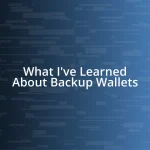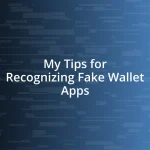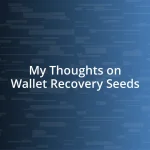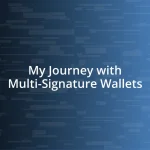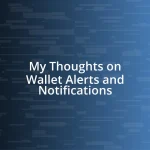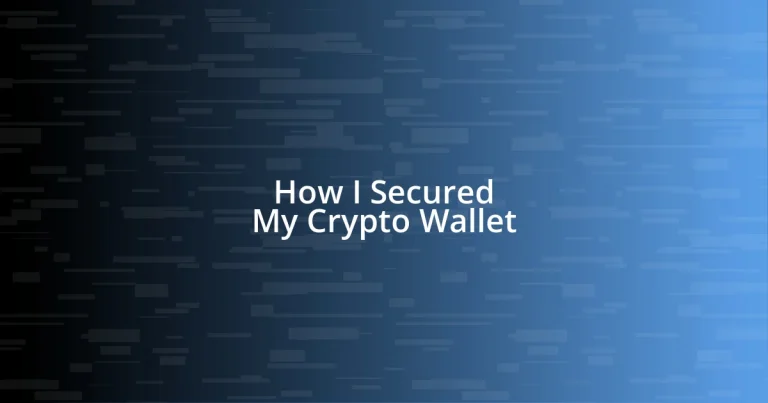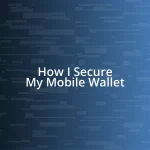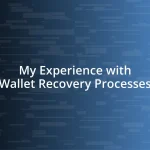Key takeaways:
- Understanding different crypto wallet types (software vs. hardware) is crucial for asset security.
- Implementing strong security practices, such as complex passwords and two-factor authentication, greatly enhances wallet protection.
- Staying informed about security trends and engaging with the crypto community can help prevent and address potential threats.
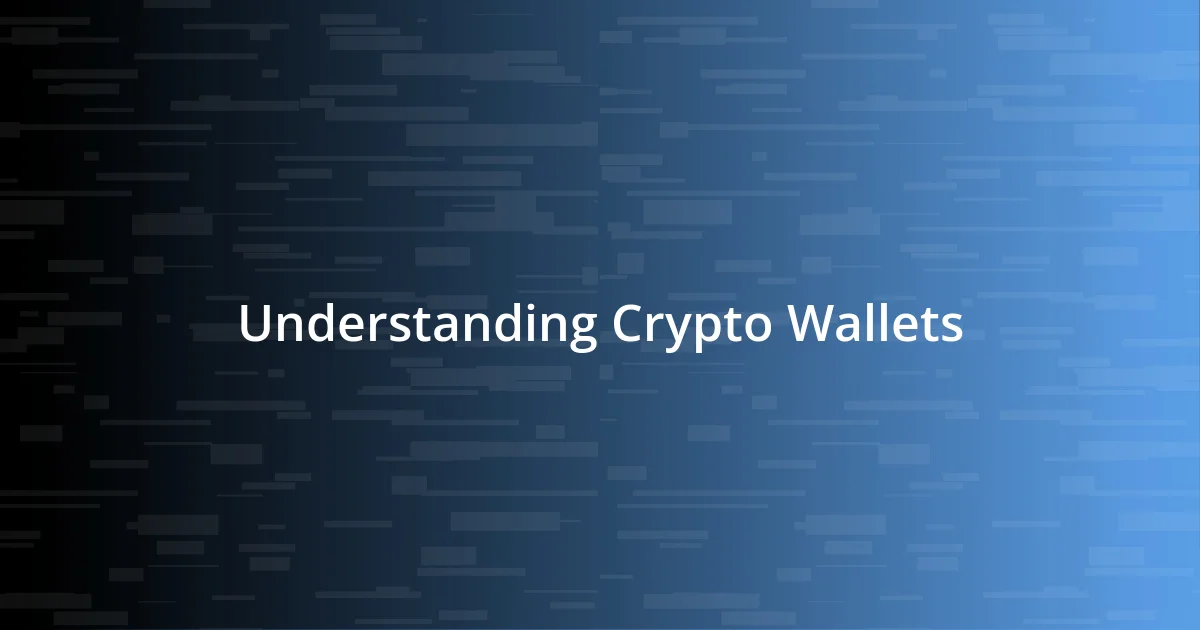
Understanding Crypto Wallets
Crypto wallets are essential tools for anyone involved in the world of digital currencies. When I first started trading, I remember feeling overwhelmed by the different types of wallets available—software, hardware, and even paper wallets. Each type serves a specific purpose, but understanding the nuances between them is key to securing your assets effectively.
Using a software wallet is like having a virtual purse; you can quickly access and use your coins but at a slight risk of exposure to online threats. I learned this the hard way when I mistakenly clicked on a phishing link, which nearly cost me my funds. That experience really drove home the importance of safeguarding access to my wallet, making me appreciate the differences in security between wallet types.
On the other hand, hardware wallets provide a more robust layer of protection by storing your private keys offline. For me, transitioning to a hardware wallet felt empowering—it gave me peace of mind knowing that my investments were safe from potential hacks. Isn’t it reassuring to think that with the right tools and knowledge, you can have full control over your digital currency?
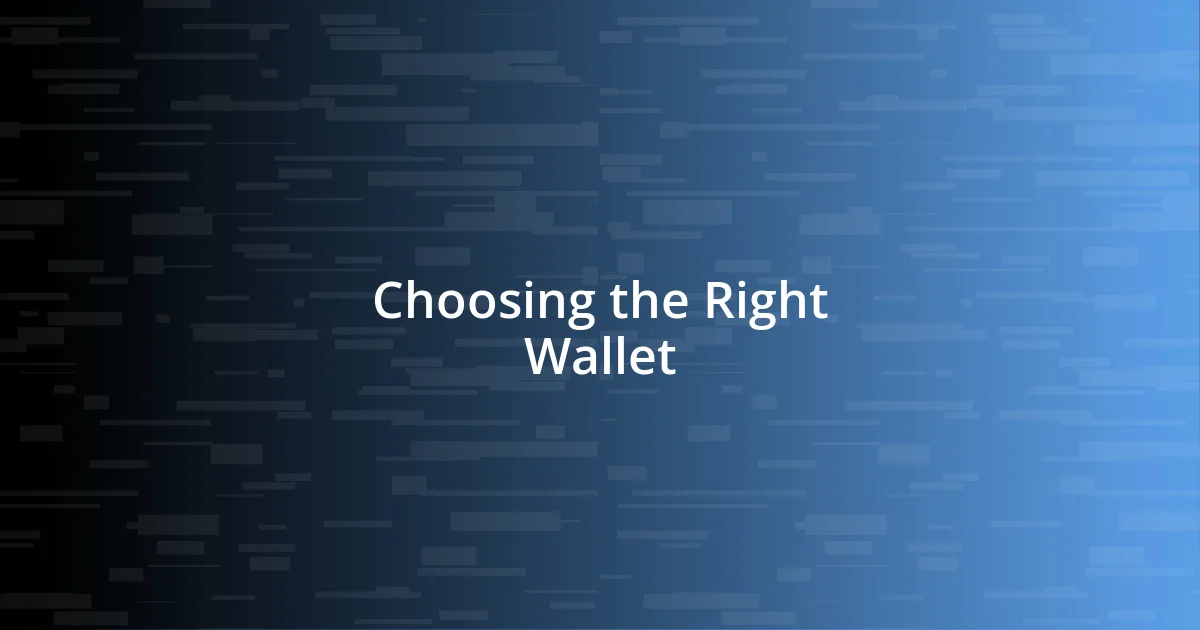
Choosing the Right Wallet
Choosing the right wallet can feel like navigating a maze, especially for beginners. I remember sitting for hours, flipping between different wallet reviews, trying to find what suited my needs best. Over time, I realized it’s all about striking a balance between convenience and security.
Here are key factors to consider when making your choice:
- Security Features: Does the wallet offer two-factor authentication or encryption?
- Usability: Is it user-friendly for someone like me, who wasn’t tech-savvy?
- Backup Options: Can I easily back up my wallet, ensuring I won’t lose access to my funds?
- Supported Coins: Does it support the cryptocurrencies I want to store or trade?
- Cost: What are the fees associated with using this wallet?
Every consideration felt personal to me. When I opted for a hardware wallet, the sense of relief I felt was almost palpable; I knew that my crypto dreams were now a lot safer.
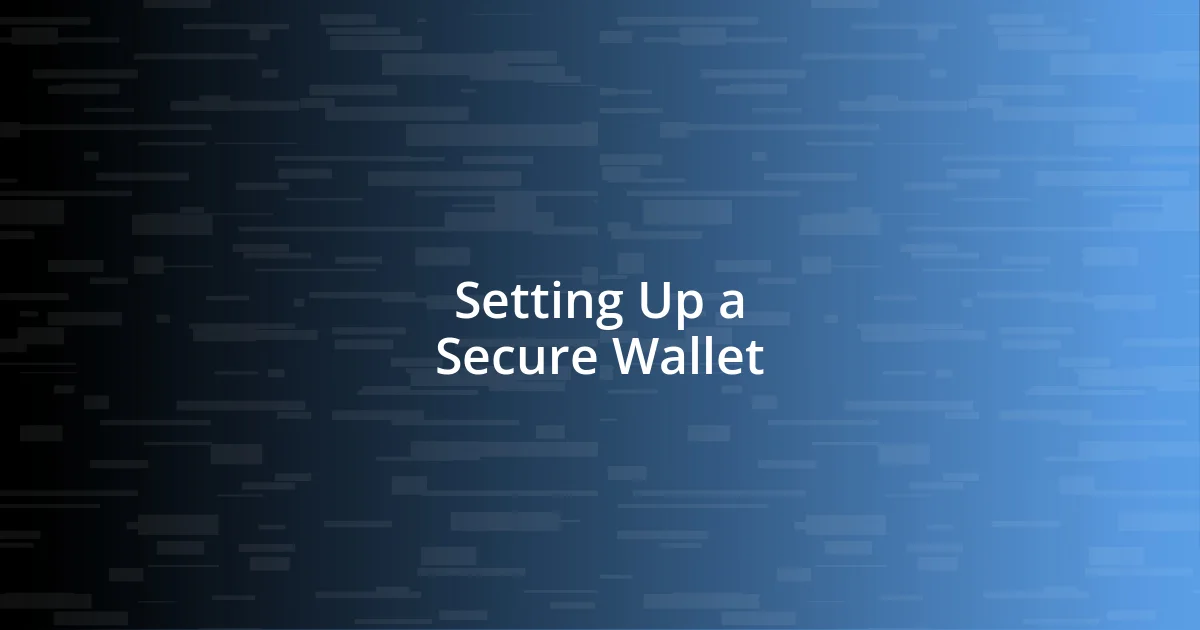
Setting Up a Secure Wallet
When I decided to set up my crypto wallet, the importance of following best practices became clear quickly. Initially, I chose a strong password—one that was a blend of letters, numbers, and special characters. I still remember the anxiety I felt as I typed it in, knowing that this was the first line of defense against potential threats. After that, I activated two-factor authentication. Honestly, it felt like putting an extra lock on my digital door—absolutely necessary for peace of mind.
Another crucial step I took was ensuring that my wallet software was up-to-date. I remember being quite skeptical about software updates, but I learned that each new version often contains important security enhancements. It’s like upgrading your home’s security system; you want to ensure you’re protected from the latest vulnerabilities. I also set up a recovery phrase as a safeguard. I made sure to write it down in a secure place, feeling a swell of confidence, knowing that I’d be able to regain access if anything went wrong.
Additionally, I explored hardware wallets as a more secure option for long-term storage of my crypto assets. The first time my hardware wallet arrived, I felt a mixture of excitement and apprehension. I recalled my earlier days of trading online and how vulnerable I felt. Setting it up was a breeze—insert the device, follow the prompts, and before I knew it, my digital fortune was tucked away safely out of reach from hackers. This tangible security gave me a sense of control that I had longed for.
| Wallet Type | Security Level |
|---|---|
| Software Wallet | Moderate (subject to online risks) |
| Hardware Wallet | High (offline storage) |
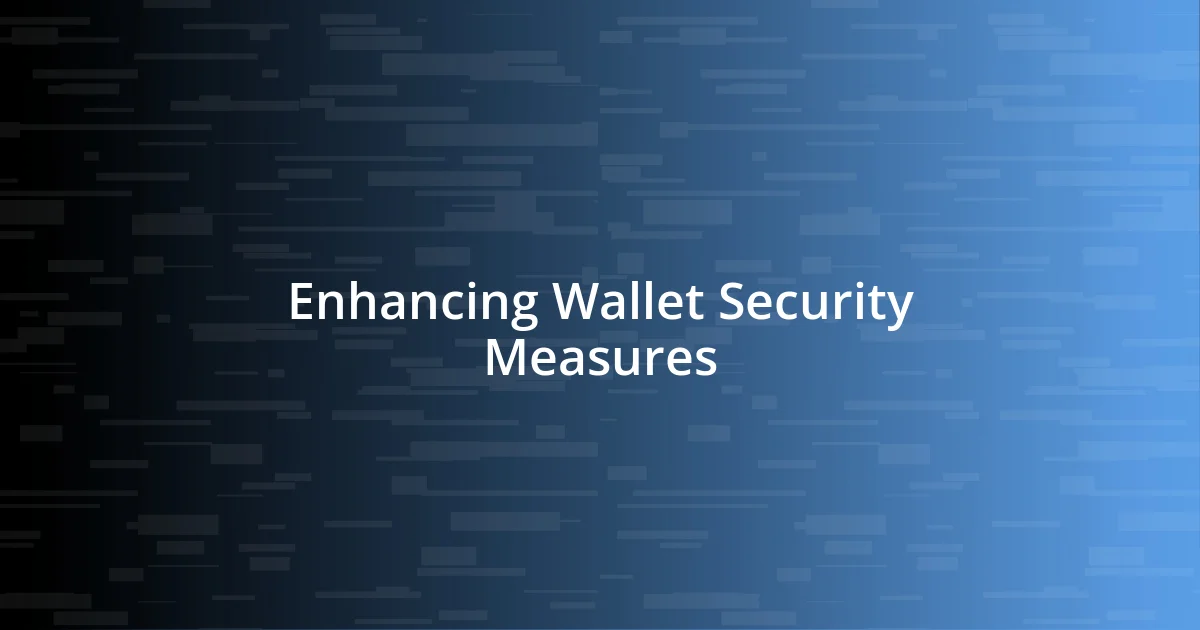
Enhancing Wallet Security Measures
When it comes to enhancing wallet security measures, I can’t stress enough the importance of creating a unique and complex password. Early on, I opted for the usual “123456” type of passwords, but once I learned how easily they could be hacked, I felt compelled to change. I can’t tell you how liberating it felt to craft a password that melded uppercase letters, numbers, and symbols—it was like a security blanket on my digital assets.
Another vital practice I adopted was regular monitoring of my wallet activity. I remember feeling nervous the first time I reviewed my transaction history; it seemed tedious but necessary. Being vigilant not only brings peace of mind but also allows you to spot any irregularities early on. I learned the hard way that being proactive in this way can prevent potential losses and give you that extra layer of security.
Additionally, I made it a habit to educate myself about phishing attempts. There was a time when I almost clicked on a dubious link that promised an enticing investment opportunity. I still feel a rush of adrenaline thinking about it. Understanding the signs of phishing helped me avoid scams and reassured me when navigating the sometimes murky waters of cryptocurrency. Have you ever wondered how many people fall victim to these tactics? Awareness is key—not just for protecting your wallet, but for building your confidence in the crypto world.
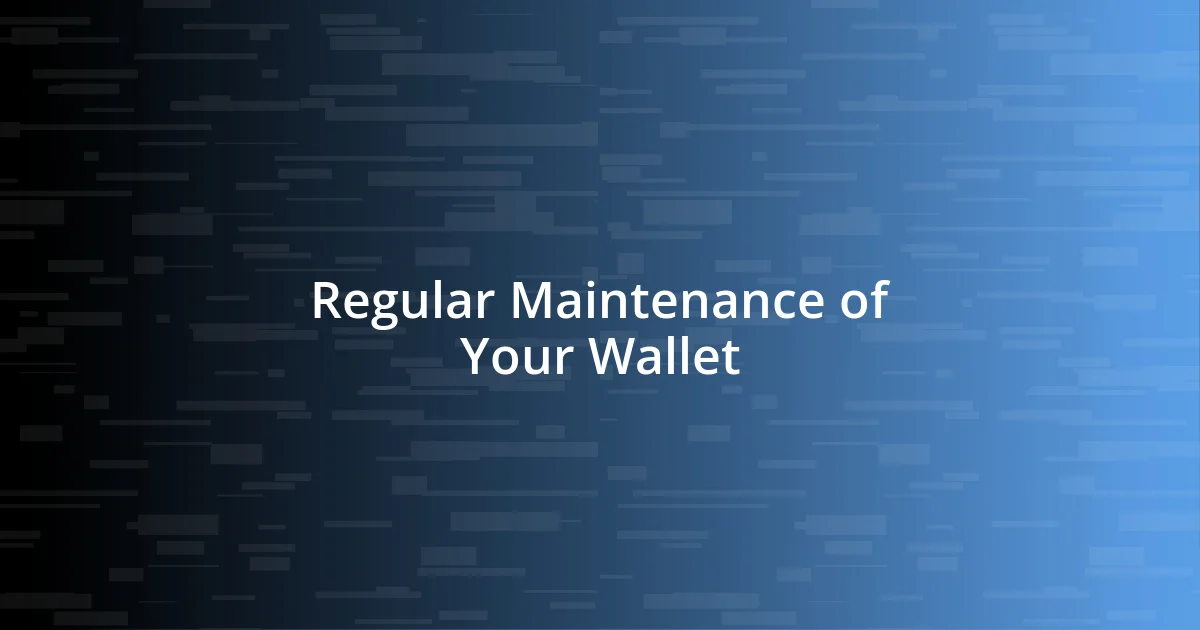
Regular Maintenance of Your Wallet
Maintaining my crypto wallet has become a routine part of my life, much like checking my bank statements. I remember the first time I conducted a thorough review of my wallet’s settings and security measures; it felt empowering. I found that regularly revisiting my security settings not only reinforced my defenses but also gave me insight into new features that could enhance my protection. It’s a bit like giving your home a periodic security check—it just makes sense.
One practice that has made a significant difference is keeping backup copies of my wallet information. I can’t emphasize enough the sense of relief I felt when I took the time to back up my wallet to a secure external drive. In moments of doubt, like when my computer unexpectedly crashed, I had the peace of mind knowing my assets were safe. Have you ever considered what would happen if your wallet data disappeared? A simple backup can save you from an emotional rollercoaster.
Frequent updates are also vital for wallet performance. There was a time I neglected to check for software updates regularly, thinking it was unnecessary. But after an unexpected downtime due to an outdated version, I quickly learned how essential those updates were. Now, I schedule reminders for myself, treating wallet maintenance with the same seriousness I would for an important appointment. It’s remarkable how a small gesture can lead to significant security and ease of mind in this complex digital landscape.
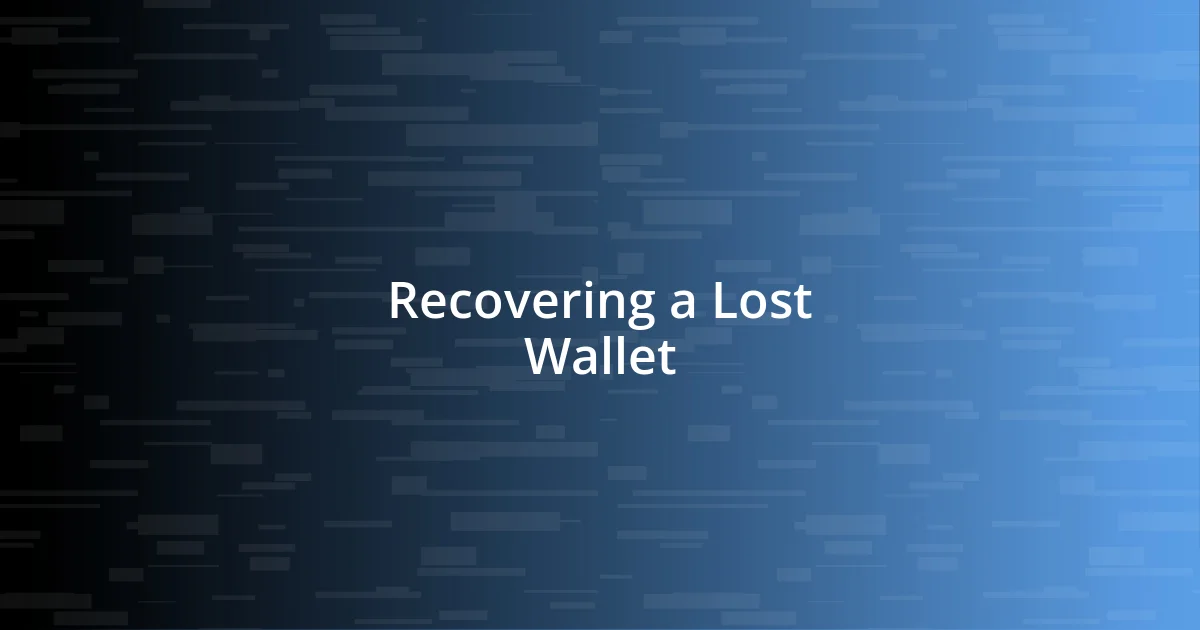
Recovering a Lost Wallet
Recovering a lost wallet can be a nerve-wracking experience, but I’ve navigated that path, and I can tell you—staying calm is crucial. One time, I misplaced my hardware wallet during a trip, and panic set in quickly. After a deep breath, I remembered that I had securely stored the recovery seed phrase and my backup keys. It was such a relief to realize that even in the chaos, I had taken precautions.
If you’ve lost access to your wallet, your first step should always be to check if you’ve set up any recovery options, like a two-factor authentication (2FA) backup. I once found myself in this situation and, fortunately, I had a secondary email linked to my wallet. After a couple of simple steps and a few emails, I managed to regain access. It made me reflect on how these extra layers of security can serve as lifesavers when we need them most.
In cases where traditional recovery methods don’t work, don’t lose hope. I learned this from a friend who faced significant losses before finally recovering their funds after months of persistence. They contacted customer support and worked through the recovery process—an exhausting endeavor to say the least! Sometimes, a little determination goes a long way, and reaching out can open doors you didn’t know existed. Have you ever faced such a hurdle? It’s an uncomfortable position, but knowing there are ways to recover can change the narrative entirely.
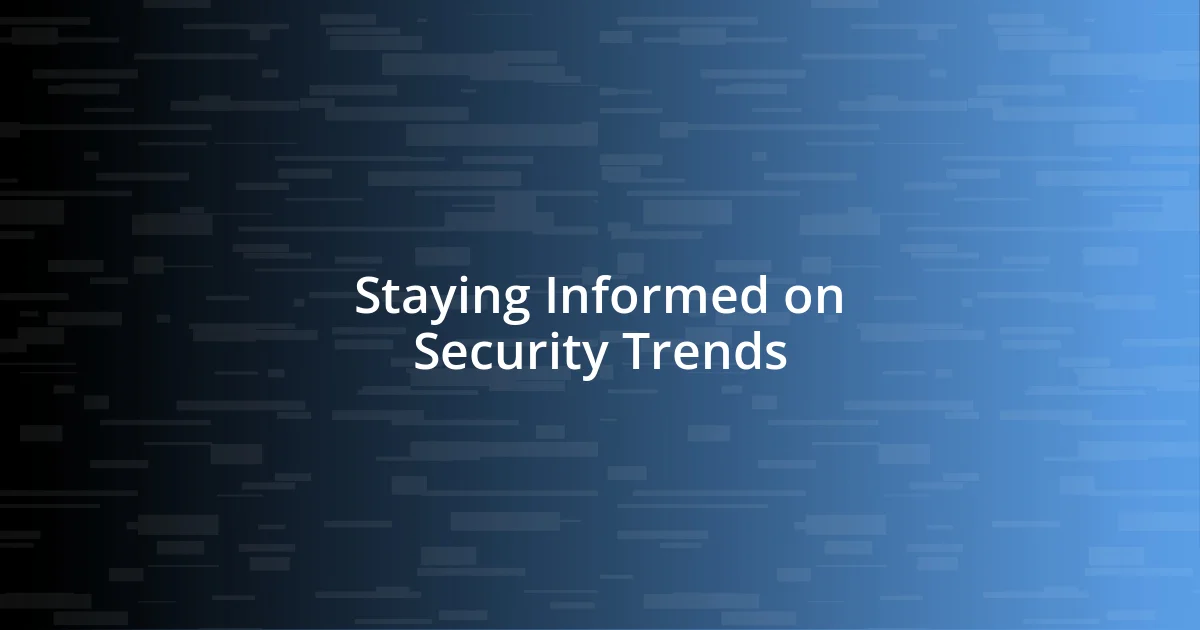
Staying Informed on Security Trends
Staying informed on security trends is crucial in the fast-evolving world of cryptocurrency. I remember attending a virtual seminar about the latest scams targeting crypto users. It opened my eyes to how quickly fraudsters adapt their tactics. Regularly checking trusted sources, like cybersecurity blogs and community forums, keeps me ahead of potential threats. Have you ever felt overwhelmed by the rapid changes in tech? Staying informed simplifies that complexity, providing clarity and confidence in my decisions.
One of the best strategies I’ve adopted is following industry experts on social media. Engaging with their insights goes beyond reading articles; it’s like being part of a conversation that shapes the future of crypto security. I recall a thread where a cybersecurity expert shared about the rise of phishing scams that mimic legitimate wallet services. Their warning helped me implement additional measures before I faced a potential breach myself. Not only have I learned to spot red flags, but I’ve also developed a more proactive approach to my wallet’s security.
Additionally, joining online communities focused on crypto security has been a game changer for me. Just last month, a forum discussion sparked my interest in using a hardware wallet for added protection. Connecting with like-minded individuals who share their experiences offers practical tips that I wouldn’t have known otherwise. It’s a reminder that we’re all in this together, hoping to navigate an often treacherous landscape. So, when was the last time you engaged with a community that could enhance your security knowledge? Trust me, the collective wisdom can be a powerful tool in safeguarding your assets.
